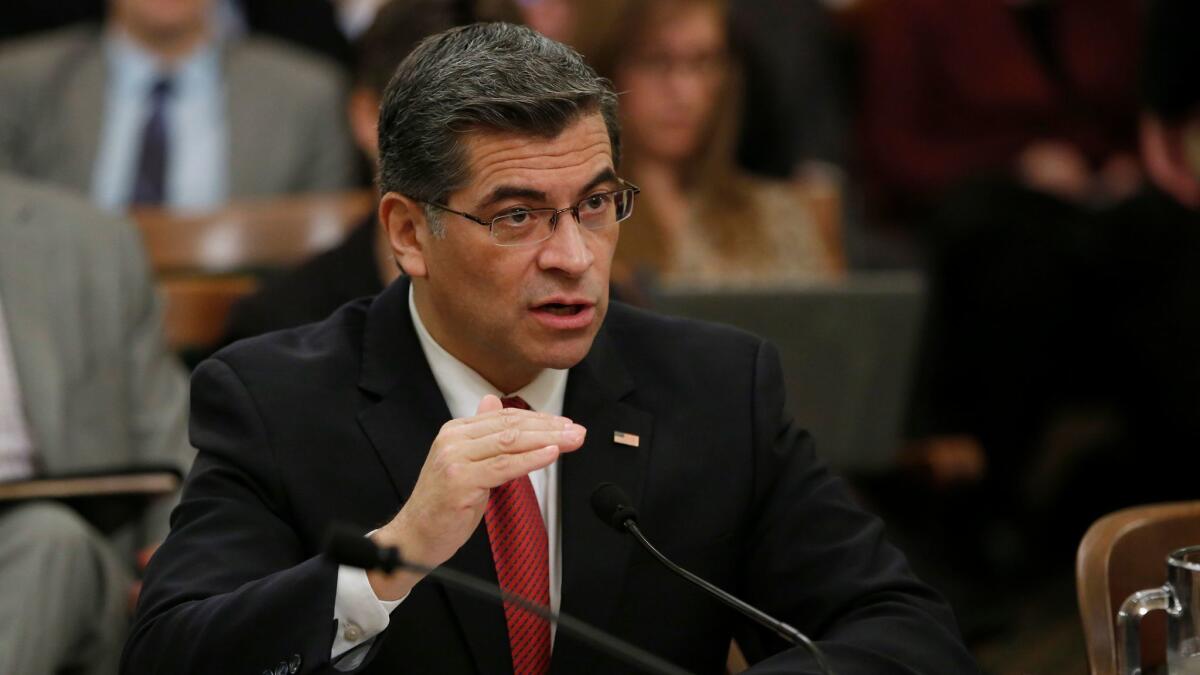California sues Uber and Lyft, saying drivers are employees

- Share via
California sued Uber and Lyft on Tuesday, alleging the ride-hailing companies have illegally treated their drivers as independent contractors, depriving them of worker protections and benefits such as minimum wage and unemployment insurance.
The lawsuit, brought by state Atty. Gen. Xavier Becerra and the city attorneys of Los Angeles, San Diego and San Francisco, seeks restitution for unpaid wages it says are owed to drivers, and it requests that the court force the companies to immediately classify their drivers as employees.
Filed in the Superior Court of San Francisco, the suit argues that Uber and Lyft gave themselves an unfair market advantage by dodging expenses including drivers’ wages and local and state payroll taxes. The law enables plaintiffs to seek up to $2,500 in civil penalties per violation for drivers going back four years.
At a video news conference Tuesday, Becerra said the coronavirus outbreak had laid bare the lack of protections for drivers. “Sometimes it takes a pandemic to shake us,” he said.
The lawsuit comes after California’s Assembly Bill 5, which took effect Jan. 1, established stricter standards for which workers can be treated as independent contractors rather than employees. AB5 empowers California’s attorney general and city attorneys in the state’s most populous cities to force companies to provide minimum wage, overtime pay, workers’ compensation, and unemployment and disability insurance to workers who meet the legal test for employee classification.
Gig economy companies have largely opposed the legislation.
Lyft said in a statement it is “looking forward to working with the Attorney General and mayors across the state to bring all the benefits of California’s innovation economy to as many workers as possible, especially during this time when the creation of good jobs with access to affordable healthcare and other benefits is more important than ever.”
Uber, also alluding to the high unemployment caused by the coronavirus crisis, said California should “make it easier, not harder, for people to quickly start earning. We will contest this action in court, while at the same time pushing to raise the standard of independent work for drivers in California, including with guaranteed minimum earnings and new benefits,” a company spokesperson said in a statement.
Drivers and labor groups, which have staged rallies calling for the state to enforce AB 5, celebrated the lawsuit.
“Billionaires like to pick and choose what laws they follow,” said Carlos Ramos, a driver and organizer with Gig Workers Rising, an advocacy group that represents on-demand platform workers. “Today, California is showing that no one is above the law, not even big tech.”
Over the years, Uber and Lyft have battled numerous lawsuits alleging the companies have misclassified workers. Since February, more than 2,000 California ride-hailing drivers have filed claims against the companies, alleging Uber and Lyft owe them more than $630 million in lost wages, expenses and damages.
In response to a lawsuit brought by Lyft drivers, a federal judge in San Francisco said last month that drivers are employees under AB 5. “It’s obvious” AB 5 was intended to apply to drivers at companies like Lyft, and refusing to reclassify drivers Lyft is “really disregarding the rule of law,” U.S. District Judge Vince Chhabria said during a April 2 teleconference,according to Bloomberg.
Still, Chhabria rejected an emergency motion to immediately classify drivers seeking sick pay as employees amid the coronavirus outbreak, saying the case was filed hurriedly and “riddled with defects.”
The companies say they do not employ the drivers but rather act as intermediaries between drivers and riders. They anticipated a crackdown by the state, and have mounted a vehement campaign against AB 5, spending the better part of 2019 working to derail the bill before state lawmakers approved it.
Two days before the law went into effect, Uber and delivery startup Postmates filed a suit alleging that AB 5 violates individuals’ constitutional rights and unfairly discriminates against technology platforms and those who make a living through such platforms.
Uber and Lyft, along with other gig-economy companies, have poured $110 million into a ballot measure in California that could serve as an alternative to AB 5. The measure would create a third category of work in between contracting and employment.
During Tuesday’s news conference, Los Angeles City Attorney Mike Feuer said the ballot campaign would not affect the state’s lawsuit even if the gig companies are successful in their efforts to overturn AB 5. The law simply codifies and clarifies the state supreme court’s 2018 ruling in Dynamex Operations West vs. Superior Court, which established the stricter test that determines whether a worker is a contractor or employee. That ruling would remain in effect.
Ride-hailing companies are just one category of California businesses that have pushed back against the new law. For instance, the trade group representing California newspapers has asked lawmakers to exclude newspaper delivery workers from being classified as employees, saying the move could further weaken the fiscal health of some publications. Management of the Los Angeles Times, as well as the paper’s editorial board, has supported that effort.
Gov. Gavin Newsom said at a briefing Tuesday that he planned to request more money in the state budget for the purpose of enforcing AB 5.
More to Read
Inside the business of entertainment
The Wide Shot brings you news, analysis and insights on everything from streaming wars to production — and what it all means for the future.
You may occasionally receive promotional content from the Los Angeles Times.












